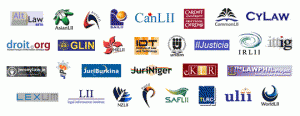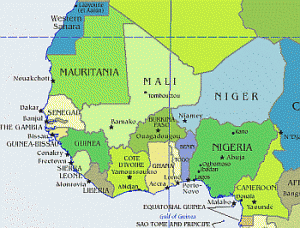 How are free access to law (FAL) services being used throughout the world? And how can these services be made sustainable? This post describes a research effort devoted to answering those two questions. The effort is funded by IDRC, and is being conducted by the Chair on Legal Information at the University of Montreal.
How are free access to law (FAL) services being used throughout the world? And how can these services be made sustainable? This post describes a research effort devoted to answering those two questions. The effort is funded by IDRC, and is being conducted by the Chair on Legal Information at the University of Montreal.
[Lexum — the Canadian legal technology firm that created and administers CanLII, the Canadian Legal Information Institute — began its existence as LexUM, a research unit of the University of Montreal. In 2009, LexUM was divided into two parts. One part, called Lexum, became an independent company, while the second part, called the Chair on Legal Information, remained with the University of Montreal. For purposes of simplicity, “LexUM” and “Lexum” will both be referred to in this post as “Lexum.”]
This post also describes my personal experience of participating in this research and learning about free access to law.
Project Overview
At the Chair on Legal Information at the University of Montreal, with a team of researchers situated all over the world, we’ve been working on two on-going research projects since 2009: (1) A review of legal information in four West African countries, and (2) a global study on the sustainability of Free Access to Law initiatives.
In conducting these research projects over more than two years, we have interviewed lawyers, magistrates, judges, law students, public servants, law librarians, and anyone else we could find who could talk about legal information in their countries.
Here is how I came to be involved in this effort.
Being Introduced to Free Access to Law
 October 2009: a 6.8-magnitude earthquake hits Indonesia; U.S. President Barack Obama receives the Nobel Peace Prize; we’re in the midst of the global financial crisis; and unbeknownst to me, I’m about to discover a world I have never heard of before: the world of Free Access to Law (FAL).
October 2009: a 6.8-magnitude earthquake hits Indonesia; U.S. President Barack Obama receives the Nobel Peace Prize; we’re in the midst of the global financial crisis; and unbeknownst to me, I’m about to discover a world I have never heard of before: the world of Free Access to Law (FAL).
The idea of Free Access to Law, although it has been around for nearly 20 years in Canada, was entirely new to me in October 2009. Prior to that, I hadn’t worked in the field of law, although I had spent years in its neighbouring field, political science, and worked for a number of groups and organisations involved in issues concerning human rights and social justice.
A fairly simple concept it seemed to me, this FAL creature. How much could there be to know about putting the law on the Internet? Through our research, I was to find that FAL is a very complex phenomenon — a world of knowledge and expertise, questions and debates, values and principles; and a movement in which hundreds upon hundreds of individuals from all around the globe are active — and that many factors influence the effectiveness and sustainability of FAL services.
The First Study: The Use of Free Access to Law Services in West Africa
For the first study, our purpose was to find out how lawyers were accessing and using legal information in our subject countries: Burkina Faso, Niger, Senegal, and Togo.
 The context for this study was the development of free access to law services in these countries. In the first half of the 2000s, free access to law (FAL) initiatives for the countries of Burkina Faso and Niger — JuriBurkina and JuriNiger, respectively — were launched with the coordination of Lexum. Once JuriBurkina and JuriNiger had begun operations, efforts were soon in place to develop similar sites in Senegal and in Togo. In Senegal, after expressing initial enthusiasm for the idea, the Bar eventually lost interest in the project and declined to cooperate in moving the project forward. In Togo, the Bar expressed its interest in the project a little late, so Lexum included them in a review of legal information project, while seeking their support for FAL efforts at the same time
The context for this study was the development of free access to law services in these countries. In the first half of the 2000s, free access to law (FAL) initiatives for the countries of Burkina Faso and Niger — JuriBurkina and JuriNiger, respectively — were launched with the coordination of Lexum. Once JuriBurkina and JuriNiger had begun operations, efforts were soon in place to develop similar sites in Senegal and in Togo. In Senegal, after expressing initial enthusiasm for the idea, the Bar eventually lost interest in the project and declined to cooperate in moving the project forward. In Togo, the Bar expressed its interest in the project a little late, so Lexum included them in a review of legal information project, while seeking their support for FAL efforts at the same time
In our first study, we sought answers to the following questions: What kind of information did lawyers in these countries need, in what format, how often, and for what purpose? How had these FAL Websites changed the way lawyers in these countries do their job?
Here are the key findings of the first study. First, many legal professionals in these countries knew little about the FAL sites’ existence, let alone their purpose. Second, JuriBurkina and JuriNiger were found to have had a limited impact on the way the lawyers who are their target audience conduct their research, mostly because the lawyers either didn’t know about the sites or didn’t find what they were looking for on the sites.
The legal professionals we met during our research were not talking about how they are and have been using the sites, nor how free access to legal information online has changed their research habits. Rather, we were being told about the potential of the sites, and what is likely to change -– and this only in the instances in which the respondent had ever heard of or used either JuriBurkina or JuriNiger.
Third, the content of the FAL sites in these countries was very limited. These content limitations appeared to affect users’ perceptions of the relevance of the sites. When we examine the sites, we see little in the way of updates and few documents. JuriBurkina, hosted locally, was also down on a regular basis until Lexum brought it back on its servers, where it’s been available ever since.
Fourth, contextual factors contributed significantly to these content limitations. In Burkina Faso, Lexum and the local Bar were hoping to launch an all-inclusive legal information portal for the country, where users could access statutes, statutory material, case law, and eventually secondary material as well. Yet restrictions on access to legislative content led to the launch of a site containing mostly case law — in a civil law country. In Niger, access to judgments was greatly limited following the 2010 coup. With a military regime in place, data sources were less than keen on handing over decisions.
Fifth, differential access to technology may have affected the perceived usefulness of the FAL services. Both the lawyers and law students we met in West Africa have greater access to mobile phones (that lack Internet access) than they do to computers with Web access, and the West African FAL sites are available only via the Web.
The Second Study: The Sustainability of Free Access to Law Services
Our second, global study is known as the “Free Access to Law – Is it Here to Stay?” research project. [Editor’s Note: The first report related to this study is available here.] With partners in Asia, Southern Africa, and West Africa, we have attempted to evaluate how we could ensure that sites providing legal information for free to the public can continue to do so in the long term. We were interested not just in funding models, but also in organizational models, taking into consideration variables related to political, social, and technological contexts. We asked: Can a strong team of dedicated individuals, with know-how and funding, build sustainable FAL initiatives?
For this second project, too, we went around interviewing the usual suspects — users and makers of freely accessible legal information — in Burkina Faso, Niger, Mali, India, Indonesia, Hong Kong, the Philippines, Uganda, Kenya, and South Africa. We asked the makers of FAL such questions as: How were they running their sites, coping with limited resources, deciding on which projects to undertake, and managing relationships with data sources?
Here are some key findings of this study. First, contextual factors, particularly political and technological, are critical to an FAL initiative’s capacity to ensure sustainability. Without the participation of those who make the law, be it legislative or case law, it is difficult for an FAL initiative to fulfill its mission.
Technological contextual factors are of particular importance respecting the sustainability of FAL initiatives. Legal Information Institutes have elected the Web as the best way to offer public and free access to legal information: The Web is relatively cheap, and reaches unparalleled numbers of users instantaneously. But easy and inexpensive Internet access — unfortunately, like many things in this world — is not a universal fact of life. Although perhaps one of the most democratic forums of our time, the Web is still far from being available in most households around the globe. [Editor’s Note: The ITU’s The World in 2010 pamphlet provides recent data on Internet use and access in developing countries.]
Second, respecting securing user buy-in to an FAL site, we found that the key is to ensure that the information published is highly relevant: that it is the information most needed by the site’s users. If FAL is to continue to play the pivotal role it has had in defining how users access legal information, sustainability is going to depend on our capacity to adapt, such that we provide a service needed by specific groups of users operating in specific contexts.
Common Findings of Both Studies
The findings of the studies actually coincide in more than one way. The first concerns the importance to users of the perceived relevance of information available from FAL services. This may seem like an obvious conclusion, but it was not expressly stated by our respondents, and had to be inferred from our data. The users we met had a tendency to speak of the “comprehensiveness” of collections as being one of the primary factors determining whether they would adopt an information source for their professional needs. A strong majority also said that before searching online, they would refer to their firm’s private collection, to their national archives, or to their Bar’s library. But their firm’s private collections were far from being “comprehensive.” What those collections were, though, was targeted, and focused on the lawyers’ specific informational needs.
The second common finding concerns the importance of contextual factors to the sustainability and perceived usefulness of FAL sites. Many free access to law initiatives are faced with limited access to technological, human, and financial resources. For initiatives working under such constraints, carefully choosing which information to prioritize for publication is essential. Yet, as noted above, our research suggests that the information that is published must be perceived as highly relevant by the users of the FAL service, if users are to “buy-in” to the service for the long term and integrate the service into their research practices.
In addition, the contextual factor of technology seems to affect both the sustainability of FAL sites and users’ perceptions of the usefulness of those sites. The evidence from West Africa suggests that the inability of lawyers and law students to access FAL sites via mobile phones may have contributed to users’ perceptions that the sites lacked relevant information. Respecting sustainability, the persistence of low levels of Internet access in developing countries poses a possible obstacle to widespread public buy-in to Web-based FAL services over the long term.
Issues Needing Further Research
In addition to the issues raised by the findings discussed above, our research on the use and sustainability of free access to law services has also highlighted additional issues that warrant further study. The first concerns justice and the rule of law. Free access to law, as a movement, gives itself the mandate to reinforce the rule of law. But in societies where a great social distance divides those who produce the law and those governed by it, we may need to go beyond the concept of law and start thinking about justice.
The second concerns the role of law in highly unequal societies. What is the role of a free access to law initiative in a context in which the law and legal information are not considered to belong to the public? In which legal information — written in a language not spoken by the majority of the population — is effectively the property of the elite? In which the law in force is a tool of oppression and segregation?
The third concerns access to technology and the digital divide. Limitations on Internet access must be taken into consideration not only respecting sustainability and users’ perceptions of the relevance of FAL services, but also to insure the coherency of FAL’s mission to democratize access to legal information. After over a decade of free access to law around the world, we must never stop thinking about what’s next and how we can best ensure open access.
Reflections and Conclusion
April 2011: I’ve now worked on IDRC-funded free access to law projects with Lexum and the Chair on Legal Information at the University of Montreal for just less than two years. When I began this work in the fall of 2009, free access to law seemed to me to be a relatively “simple” concept. Now, after eighteen months of research, I’ve come to understand the complexity and large scope of free access to law: that it involves hundreds of professionals working on six continents; that its success and sustainability are influenced by numerous technological, political, and social factors; and that its value depends in large part on cultivating relationships with users in their particular social and cultural contexts.
and that its value depends in large part on cultivating relationships with users in their particular social and cultural contexts.
Keep an eye out for our case studies coming out this summer—but to sum things up for now, it would be simply that, like most things in the social sciences, one size does not fit all.
[Editor’s Note: For an earlier commentary on the sustainability of legal information institutes, please see Mariya Badeva-Bright’s VoxPopuLII post, Is Free Access to Law here to stay?]
[Editor’s Note: The original version of this post contained an error. The original version of the post stated that the studies described in the post are being conducted by Lexum and the Chair in Legal Information of the University of Montreal. That information is incorrect. The studies described in the post are being conducted solely by the Chair in Legal Information of the University of Montreal. Lexum has no role in the studies. We regret the error. The post has been corrected as of 5 May 2011.]
 Isabelle Moncion is a research assistant at the Chair in Legal Information of the University of Montreal, and a project manager with Lexum. She holds an MA in political science with a specialisation in international development from the University of Quebec in Montreal, and a B.Sc. in political science and communications from the University of Ottawa.
Isabelle Moncion is a research assistant at the Chair in Legal Information of the University of Montreal, and a project manager with Lexum. She holds an MA in political science with a specialisation in international development from the University of Quebec in Montreal, and a B.Sc. in political science and communications from the University of Ottawa.
VoxPopuLII is edited by Judith Pratt. Robert Richards is Editor in Chief.




